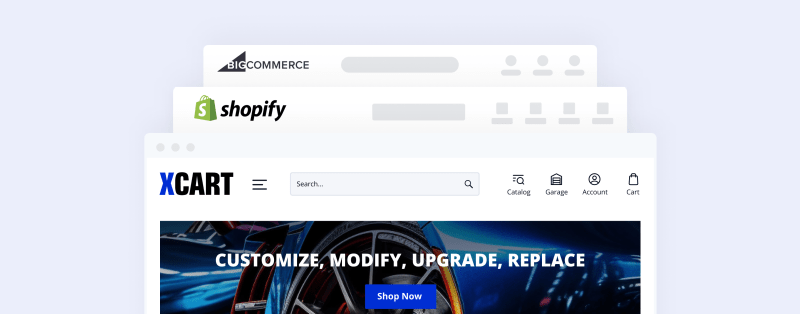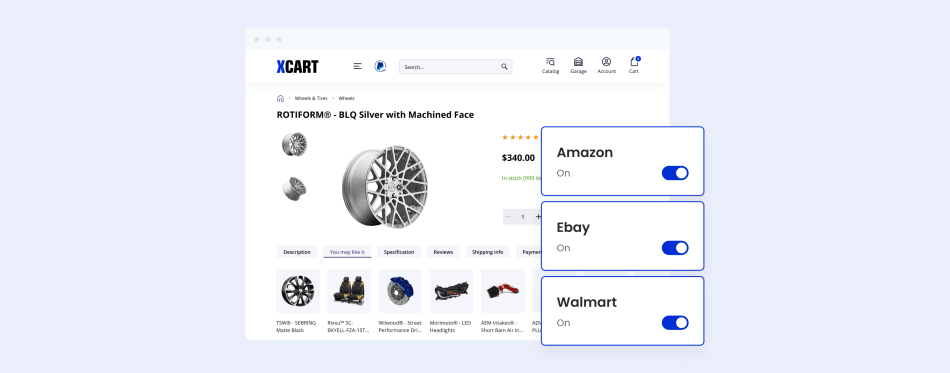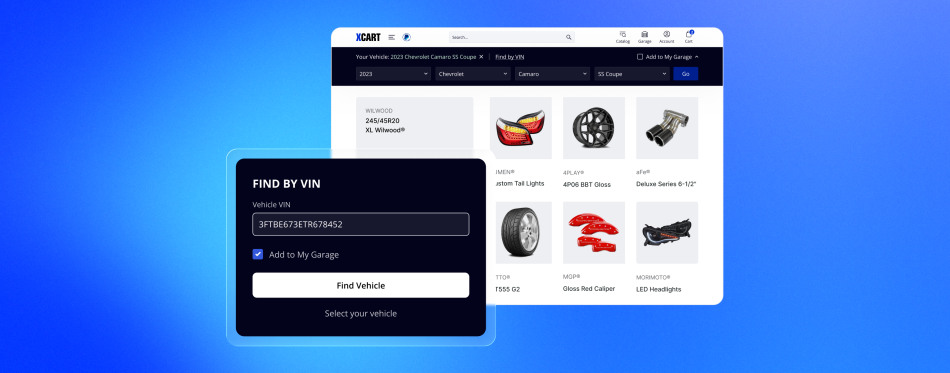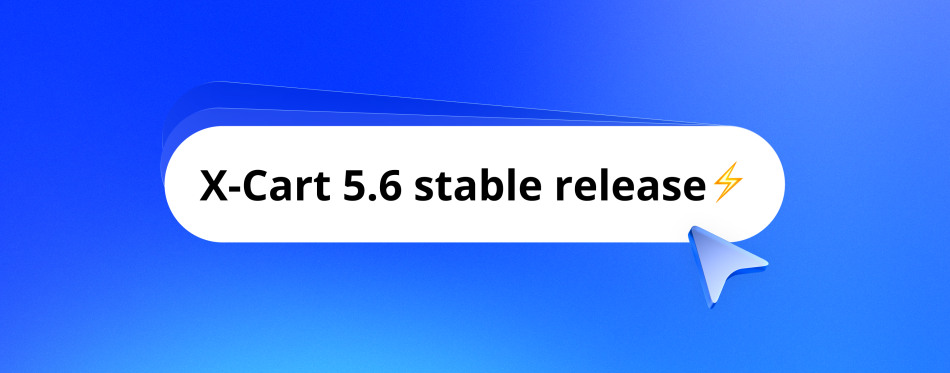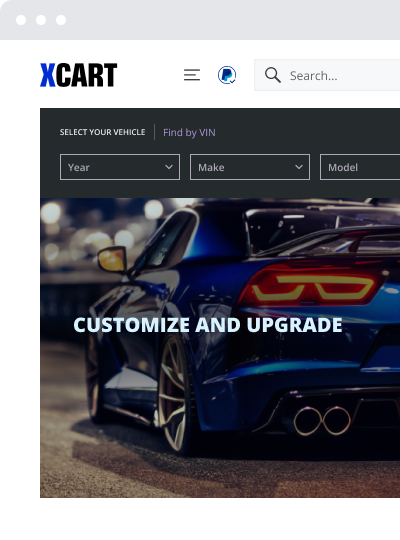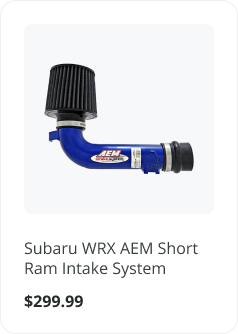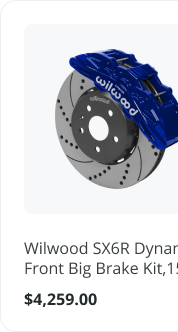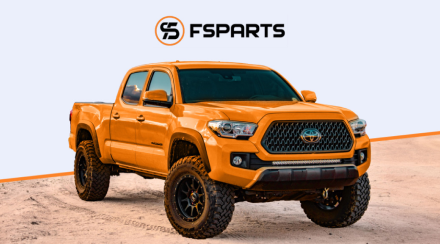X-Cart vs. Shopify vs. BigCommerce for Automotive Aftermarket eCommerce Businesses
Like a properly tuned engine ensures smoother drivability under various weather conditions, powerful automotive eCommerce software makes your online business more flexible to adjust to ever-emerging trends and constantly evolving business needs. This is why finding the right eCommerce platform to back your auto parts online store is crucial.
To make your online business successful and competitive, you’ll need an automotive solution that understands the needs of the auto parts retail industry, namely:
- offers seamless catalog and inventory management;
- provides accurate and standardized fitment data;
- has direct integrations with warehouse distributors and drop shipping software solutions;
- delivers an outstanding purchase experience and sales features to keep customers coming back;
- provides professional technical support that is prompt and effective.
In this blog post, we’ll compare Shopify, BigCommerce, and X-Cart, three popular shopping cart solutions, focusing on the platforms’ features, tools, and capabilities in the context of the automotive aftermarket.
To help you find the automotive website builder that would be a perfect fit for your auto parts eCommerce store, we have also compiled a complete shopping cart comparison, where we dive into everything from the basic functionality to the pros and cons, exploring software features, design templates, available apps, and customer ratings. There, we review both Shopify and BigCommerce along with X-Cart and six more platforms.
X-Cart Automotive vs. BigCommerce vs. Shopify Plus: Features Overview
To create, market, expand, and maintain their business from a single online store, an auto parts seller needs a platform that would quickly adapt to business demands and pivot to new initiatives while saving time and money with automation.
In other words, your eCommerce software should combine out-of-the-box tools with high-level customization options and be designed specifically for the automotive aftermarket industry.
With this in mind, we’ve made a list of must-have features that an automotive eCommerce solution should have and investigated whether X-Cart, BigCommerce, and Shopify provide all of them.
| X-Cart | BigCommerce | Shopify Plus | |
| API-driven eCommerce platform | ✔ | ✔ | ✔ |
| Complex and unlimited product catalogs | ✔ | ✔ | ✔ |
| Website design optimized for mobile experiences | ✔ | ✔ | ✔ |
| Smart search and filtering options | ✔ | 3P | 3P |
| Native Year Make Model filtering | ✔ | 3P | 3P |
| VIN lookup and ‘My Garage’ feature | ✔ | 3P | 3P |
| Direct integrations with auto parts data providers | ✔ SEMA Data, AutoSync, ASAP Network | SEMA Data | SEMA Data |
| Integrations with automotive warehouse distributors | Turn 14 Distribution (native app), Torqued Distribution (native app) | Turn 14 Distribution (3P) | Torqued Distribution (3P) Turn 14 Distribution (3P) |
| Accelerated console import/export | ✔ | – | – |
| Payment processing fees | no transaction fees | no transaction fees | payment processing fees based on the merchant’s sales volume |
| Integrations with various payment gateways | ✔ over 120 payment gateways | ✔ over 65 payment gateways | Payment integrations available via Shopify payments |
| Marketing and advanced SEO tools | ✔ | ✔ | ✔ |
| Multiple sales channels | ✔ | ✔ | ✔ |
| In-house development service | ✔ | – | – |
| Technical support | ✔ | ✔ | ✔ |
| Free trial | personalized free demo | free 15-day trial | free trial, first 3 months for $1/mo. |
X-Cart for Automotive eCommerce
X-Cart Automotive is a highly scalable API-driven eCommerce platform designed explicitly for online auto parts businesses.
Key X-Cart Features
- The API-driven architecture enables business owners to connect their online stores to the required apps and services flawlessly;
- X-Cart Storefront API allows for designing a custom look and feel for your online store;
- Automated complex catalog updates with standardized data from leading auto parts providers.
- Guaranteed auto parts fitment accuracy is ensured by real-time search and advanced filtering options;
- Accelerated bulk import/export and bulk editing options make catalog management easier.
- Dedicated web hosting ensures smooth website performance;
- Endless customization options with an in-house professional developer team ready to help you tailor your online store to your business vision.
Need a Truly Automotive eCommerce Solution?
X-Cart Benefits for Auto Parts Businesses
Native automotive tools: With a comprehensive set of built-in features, X-Cart minimizes the reliance on third-party apps for automotive-specific functionality, such as Year Make Model filtering and VIN lookup, catering to the requirements of automotive eCommerce, reducing the risk of plugin maintenance issues.
Scalability: X-Cart Automotive offers adaptable API-driven architecture, which allows for merging ready-made integrations with broad customization options. This provides online store owners with the tools that fit the specific requirements of auto parts eCommerce.
Direct integrations with automotive partners: X-Cart has established strategic partnerships with key automotive aftermarket players: SEMA Data, ASAP Network, AutoSync, Turn 14 Distribution, Torqued Distribution, and others. With these integrations, auto parts businesses can use accurate, standardized product fitment data and connect their stores to specific tools, such as Visual Vehicle Studio by AutoSync.
Technical support: X-Cart provides personalized 24/7 customer support via email and phone to guide you through each stage of building, setting up, and maintaining your online store. Plus, we provide additional onboarding training for our automotive clients, offering four hours of onboarding calls with a customer success manager and a technical support engineer for free.
Downsides
Complex all-inclusive solutions, such as X-Cart Automotive, may have a slower time-to-market for your online store compared to SaaS-based website builders, which is, however, balanced by shorter time-to-value.
Are you on Web Shop? Read: Is Web Shop Manager Meeting Your Auto Parts Business Needs? (and How X-Cart Can)
Selling Car Parts with BigCommerce
BigCommerce is a hosted shopping cart solution that allows businesses to create an automotive online store with essential eCommerce features such as inventory management, custom pricing, and product filtering. Just like Shopify, BigCommerce relies on third-party plugins for automotive retailers, including the Year Make Model search that ensures smooth user navigation across the website.
For a better user experience, you can also configure the look and feel of your online shop; you can use a drag-and-drop page builder to select content blocks, columns, and images and position them on your pages as you see fit.
BigCommerce Advantages
Flexibility: BigCommerce is designed to accommodate businesses of all sizes, offering a wide range of built-in features and allowing automotive retailers to customize their stores by integrating the required tools and BigCommerce themes.
No transaction fees: Unlike Shopify, BigCommerce doesn’t charge credit card processing fees for using non-standard forms of payment.
Multi-channel capabilities: BigCommerce lets sellers control their inventory from one central location. This central inventory management ensures that stock numbers are accurate across all retail platforms.
Multiple apps for auto parts sales: The BigCommerce app store includes third-party apps that can make your auto parts store more manageable. It also integrates with popular marketing tools to help you promote your website.
Downsides
Negative reviews on customer support: Despite relatively good reviews on G2, some merchants mention unprofessional customer service, ineffective support, and the fact that it takes quite a long time to solve an issue.
Low website performance: The high-SKU catalogs with multiple product pages can slow down website loads, impacting the user experience and hitting your position in Google SERPs. This is why smooth website performance is essential for automotive online stores. Some BigCommerce users have observed slow page loading times, resulting in lower rankings on Google and requiring constant and extensive optimization. Shopify outperforms BigCommerce in this.
Shopify for Auto Parts Businesses
Shopify‘s themes can be a good option for starting an online auto parts business. It offers advantages like inventory management, bulk product uploads, and smooth checkout. Due to its low learning curve and user-friendly interface, most start-ups find Shopify attractive.
However, automotive businesses that need to customize their online stores must upgrade to Shopify Plus – the enterprise-level version of Shopify – for more extensive functionality.
Shopify Plus Benefits
Low learning curve: The Shopify interface is simple, making it easy for automobile retailers without any technical background to streamline store setup and management. The only pitfall is that the cookie-cutter approach to managing your auto parts store may lead to a steeper learning curve when your business starts to grow and scale.
Extensive Shopify app store: With over 10,000 third-party plugins and extensions available in the Shopify App Store, automotive sellers can increase their store’s functionality and cater to improve customer experience.
Mobile-friendly automotive design templates: To answer the needs of car parts buyers visiting online stores via mobile devices, Shopify delivers a convenient purchasing experience through various mobile-responsive automotive themes.
Downsides
Transaction Fees: While Shopify offers various pricing plans, auto parts sellers should remember that Shopify charges credit card processing fees for using a third-party payment provider.
Costly customization and maintenance: Adding advanced functionality to your auto parts website may require knowledge of Liquid – Shopify’s proprietary language. This is a potential issue for automotive retailers with specific design and customization requirements. Hiring a developer who will flawlessly integrate the required tool with your Shopify store can be challenging and costly.
Shopify vs BigCommerce: It’s Up to You
To profitably sell automotive parts and accessories online, you should think beyond generic eCommerce capabilities, focusing on industry-specific requirements.
Features like streamlined inventory management, fitment data accuracy, seamless integrations with automotive data networks, warehouse distributors, and drop shipping solutions are pivotal for enhancing the overall customer experience.
Ultimately, the best choice depends on your unique business needs, budget, and growth plans. By looking into the features of each platform in the context of automotive eCommerce, you’ll be able to make an informed decision.
Need a Truly Automotive eCommerce Solution?
FAQs about Shopify vs BigCommerce
What are the essential built-in features automotive eCommerce platforms should offer?
An ideal automotive eCommerce solution should provide seamless catalog and inventory management, accurate and standardized fitment data (like Year Make Model and VIN lookup), direct integrations with warehouse distributors and drop shipping solutions, an outstanding purchase experience, and prompt, effective technical support.
What are the main differences between X-Cart, BigCommerce themes, and Shopify Plus for an automotive eCommerce store?
X-Cart is specifically designed for the automotive aftermarket with more advanced features for auto parts fitment. BigCommerce offers a flexible platform with a good range of built-in features and no transaction fees (for non-standard payments). Shopify Plus is known for its ease of use and extensive app store, but may require costly customizations of Shopify’s themes and technical knowledge for advanced automotive functionalities. It also charges additional transaction fees when not using Shopify Payments.
Which of these platforms (X-Cart, BigCommerce, Shopify) offers native Year Make Model filtering and VIN lookup?
X-Cart offers native Year Make Model filtering and VIN lookup compared to Shopify and BigCommerce. On these platforms, these functionalities typically require third-party (3P) apps or integrations.
How do X-Cart, and Shopify vs BigCommerce handle integrations with auto parts data providers like SEMA Data? Do they have an app ecosystem, app stores, or marketing tools?
- X-Cart: Has an extensive automotive app ecosystem, including direct integrations with SEMA Data, AutoSync, and ASAP Network. It integrates with Google Analytics, Amazon, eBay Motors, and more.
- BigCommerce: Integrates with SEMA Data only. Integrates with analytics and ad platforms.
- Shopify Plus: Integrates with SEMA Data only. Has a decent app marketplace with analytics tools and ad platforms.
What about integrations with automotive warehouse distributors?
- X-Cart: Has native app integrations with Turn 14 Distribution, Torqued Distribution, Meyer, Keystone Automotive, Wheel Pros, and more.
- BigCommerce: Supports Turn 14 Distribution and Torqued Distribution through third-party (3P) apps.
- Shopify Plus: Supports Turn 14 Distribution through a third-party (3P) app.
Are there differences in payment processing fees between these platforms?
Yes. X-Cart and BigCommerce generally do not charge their own transaction fees on top of what payment gateways charge. Shopify Plus charges payment processing fees based on the merchant’s sales volume, especially if not using Shopify Payments.
Do all three platforms offer mobile-optimized website designs?
Yes, X-Cart, BigCommerce, and Shopify Plus all provide website designs and customizable themes optimized for mobile experiences.
What are the main benefits of using X-Cart for an auto parts business?
X-Cart’s key benefits include its native automotive tools (reducing reliance on third-party apps for features like Year Make Model search), scalability due to its API-driven architecture, direct integrations with key automotive aftermarket partners, multi-channel selling capabilities, and personalized 24/7 technical support with additional onboarding for automotive clients.
Plus, behind X-Cart, there’s a dedicated online store development team that can implement any basic and custom functionality.
What are the advantages of choosing BigCommerce for selling car parts?
BigCommerce offers flexibility for businesses of all sizes, a wide range of features, no transaction fees for using non-standard payment methods, multi-channel sales tools with centralized inventory management, and access to multiple apps for auto parts online selling.
What are some reported downsides of BigCommerce?
Some users have reported issues with customer support, including unprofessional or ineffective service and long resolution times. Additionally, stores with very large (high-SKU) catalogs on BigCommerce might experience slower website performance, which can impact user experience and visibility in search engines.
What makes Shopify Plus attractive for auto parts businesses, especially startups?
Shopify Plus (and Shopify in general) has a low learning curve and a user-friendly interface, making it easy to set up and manage a store, especially for those without a technical background. It also boasts an extensive app store for adding functionality and offers mobile-friendly automotive design templates compared to many other eCommerce platforms.
What are the potential drawbacks of using Shopify Plus for an automotive eCommerce store?
Shopify charges transaction fees if you use a third-party payment provider instead of Shopify Payments. Customizing your store with advanced automotive functionalities can be costly and may require knowledge of Shopify’s proprietary language, Liquid, making it challenging to find developers for specific integrations. So, it’s not just a drag-and-drop builder.
The platform’s “cookie-cutter” approach might also become limiting as a business grows and requires more specialized features.
How do I decide which platform is the “best fit” for my auto parts eCommerce store?
The best choice depends on your specific business needs, budget, technical expertise, marketing strategies, and growth plans. Consider factors like the complexity of your catalog, your need for specific automotive features out-of-the-box or a customizable platform, your anticipated sales volume (which can affect transaction fees), and your long-term requirements for the core platform.
About the author

